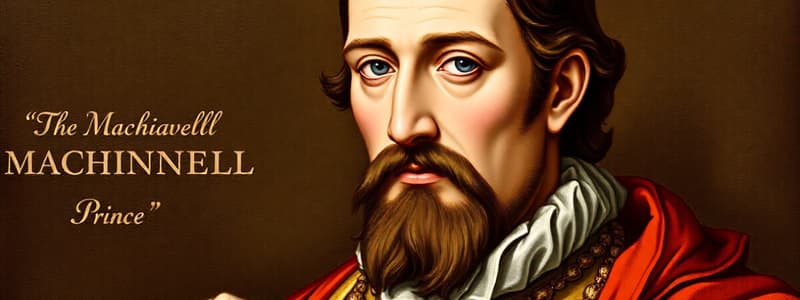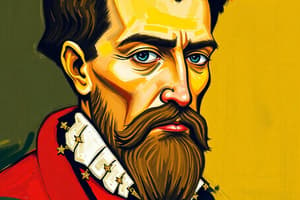Podcast
Questions and Answers
What did Machiavelli believe a prince must learn to maintain himself?
What did Machiavelli believe a prince must learn to maintain himself?
- To govern without the need for deceit
- To follow the principles of justice and honesty
- To always act with kindness and virtue
- To be indifferent to promises and moral goodness (correct)
According to Machiavelli, how should a prince react to the promises made by others?
According to Machiavelli, how should a prince react to the promises made by others?
- He should always keep his promises regardless of the situation
- He should not feel obligated to keep promises if others do not (correct)
- He should only keep promises made to his closest allies
- He should consider the consequences before making promises
What does Machiavelli imply about the nature of men in his principles?
What does Machiavelli imply about the nature of men in his principles?
- Men are understanding and forgiving of leaders' actions
- Men are unpredictable and should be treated with caution (correct)
- Men are inherently good and trustworthy
- Men are completely rational and act in their own interest
What does Machiavelli assert about the princes who achieve great things?
What does Machiavelli assert about the princes who achieve great things?
What view does Machiavelli express regarding the role of good and evil in leadership?
What view does Machiavelli express regarding the role of good and evil in leadership?
Flashcards
The Necessity of Immorality
The Necessity of Immorality
Machiavelli believed that rulers must be prepared to act in their own interests, even if it means acting immorally. He argued that morality is a luxury that rulers cannot afford.
Deception as a Tool
Deception as a Tool
Machiavelli believed that rulers should not be bound by promises and can use deception to achieve their goals. He argued that a ruler should be able to manipulate others to their advantage.
Human Nature and Self-Interest
Human Nature and Self-Interest
Machiavelli's advice is based on the assumption that human nature is inherently self-serving and that people are driven by their own interests. He argues that rulers must act accordingly.
The Balance of Good and Evil
The Balance of Good and Evil
Signup and view all the flashcards
The Importance of Practical Experience
The Importance of Practical Experience
Signup and view all the flashcards
Study Notes
Machiavelli's Admiration for Classical Antiquity
- Machiavelli admired ancient Greece and Rome, citing their historical works as influences on The Prince.
- He considered the "ancients," the classical writers of Greece and Rome, crucial to his writing.
Machiavelli's View of Human Nature
- Machiavelli believed that humans are fundamentally not good and often dishonest.
- Keeping promises is not a reliable trait in people.
Political Morality in The Prince
- A ruler needs to be flexible and not necessarily virtuous in order to succeed.
- A ruler should be ready to use deception as necessary.
- Rulers should disregard their promises to others when the situation dictates.
- A ruler's actions should be morally flexible when appropriate.
- Machiavelli argued that rulers who accomplish great things often prioritize strategic calculation over adhering to promises.
- Virtue is not the key to successful leadership.
Studying That Suits You
Use AI to generate personalized quizzes and flashcards to suit your learning preferences.




